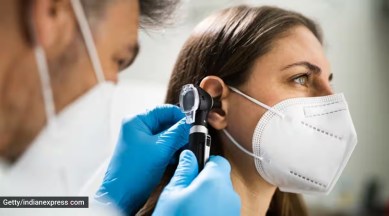📣 For more lifestyle news, click here to join our WhatsApp Channel and also follow us on Instagram
Do you experience a weird ringing in your ears? You might have tinnitus
The exact mechanism of tinnitus is not fully understood, but it is believed to arise from abnormal neural activity in the auditory system, according to Dr Manu S Babu, Assistant Professor and ENT consultant, DPU Private Super Specialty, Pimpri, Pune, which can result in damage to the auditory nerve, the cochlea, or other auditory structures.

If you’ve been attending concerts or going to clubs with loud music, only to come back home and discover there is a weird ringing in your ears, which is persisting for long intervals, it is likely you might have tinnitus.
Dr Manu S Babu, Assistant Professor and ENT consultant, DPU Private Super Specialty, Pimpri, Pune, said tinnitus is a common and often distressing condition characterized by the perception of sound in the absence of any external stimulus. It affects millions of people worldwide, he noted, causing significant discomfort and emotional distress.
monthly limit of free stories.
with an Express account.
“Defined as the perception of sound, such as ringing, buzzing, hissing, or clicking, in one or both ears or in the head, it can be subjective, wherein only the affected person can hear the sound, or objective, wherein the sound can be heard by both the individual and an external observer,” Dr Babu said.
The exact mechanism of tinnitus is not fully understood, but it is believed to arise from abnormal neural activity in the auditory system, according to Dr Babu, which can result in damage to the auditory nerve, the cochlea, or other auditory structures.
Various risk factors can contribute to the development or exacerbation of tinnitus, such as, prolonged exposure to loud noise, age-related hearing loss, earwax impaction, which is the accumulation of excessive earwax, certain medications, such as high doses of aspirin, nonsteroidal anti-inflammatory drugs (NSAIDs), antibiotics, and diuretics, can trigger or worsen tinnitus.
Dr Babu added that conditions like Meniere’s disease, temporomandibular joint (TMJ) disorders, and acoustic neuroma can also contribute to tinnitus.
What are the symptoms of tinnitus?
According to Dr Babu, symptoms can vary in intensity and may include:
1. Ringing, buzzing, hissing, or clicking sounds in the ears or head.
2. Perception of sound that may be constant or intermittent.
3. Disturbed sleep patterns, difficulty concentrating, and increased stress levels.
4. Impact on quality of life, work performance, and mental well-being.
How can you manage it?
Although there is no known cure for tinnitus, management strategies aim to reduce the perceived impact and improve the individual’s quality of life, Dr Babu explained. Some commonly employed approaches include:
1. Identifying and treating underlying causes: Addressing any underlying medical or otologic conditions, such as earwax impaction or TMJ disorders, may provide relief from tinnitus symptoms.
2. Sound therapy: Background noise or sound enrichment can be used to distract the individual from the perception of tinnitus. This can be achieved through the use of environmental sound machines, fans, or low-level music.
3. Cognitive behavioral therapy (CBT): CBT techniques can help individuals reframe their thoughts and emotions associated with tinnitus, reducing distress and promoting coping mechanisms.
4. Relaxation techniques: Stress and anxiety can exacerbate tinnitus symptoms. Practices like deep breathing, yoga, meditation, and progressive muscle relaxation can help manage stress and improve overall well-being.
5. Acoustic therapy: Acoustic therapy, also known as sound-based therapy, involves the use of specialized devices that deliver therapeutic sound stimuli to alleviate tinnitus symptoms. These devices can include hearing aids, sound generators, or combination devices that integrate both functions.
Tinnitus is a complex condition that can significantly impact an individual’s quality of life. Understanding the risk factors, etiology, and management options for tinnitus is crucial in providing relief and support for affected individuals. If you or someone you know experiences tinnitus, it is advisable to seek professional guidance for accurate diagnosis and appropriate management strategies.
📣 For more lifestyle news, follow us on Instagram | Twitter | Facebook and don’t miss out on the latest updates!
📣 For more lifestyle news, click here to join our WhatsApp Channel and also follow us on Instagram